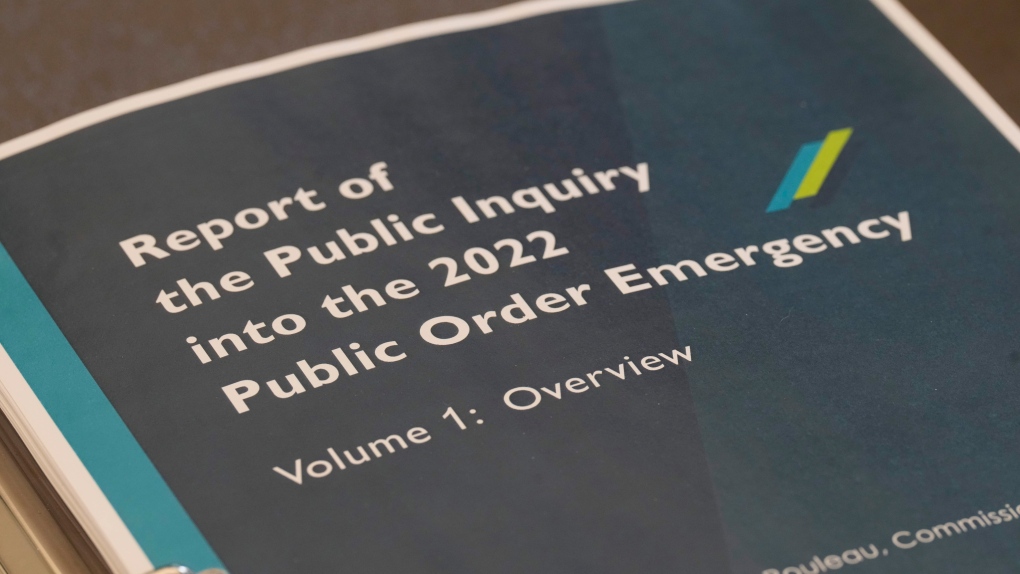Participating in Emergencies Act inquiry cost city of Ottawa $890,000
 A copy of Justice Paul Rouleau's report on the Liberal government's use of the Emergencies Act, is shown in Ottawa, Friday, Feb.17, 2023. (Adrian Wyld/THE CANADIAN PRESS)
A copy of Justice Paul Rouleau's report on the Liberal government's use of the Emergencies Act, is shown in Ottawa, Friday, Feb.17, 2023. (Adrian Wyld/THE CANADIAN PRESS)
The city of Ottawa has spent nearly $900,000 on participating in the Public Order Emergency Commission (POEC).
The inquiry into the federal government's use of the Emergencies Act to quell the "Freedom Convoy" demonstrations in 2022 lasted for six weeks and heard from several city officials, including former councillors, the former city manager, the former police chief, and the former mayor. The city also provided more than 30,000 records to the commission.
In a report prepared for Wednesday's city council meeting, staff say participating in the POEC has, as of Feb. 7, cost the city $890,840, largely in legal fees, database and file transfer services and administrative costs related to document production.
The city retained Gowling WLG as external legal counsel, working with the city solicitor, the report states.
"The City’s public inquiry response team, which was already engaged in the response to the provincial Ottawa Light Rail Transit (OLRT) Public Inquiry, undertook the work of responding to the Commission, using a similar structure and led by the Corporate Public Policy Advisor in the City Manager’s Office and the City Solicitor," the report says.
The commission heard from now former councillors Catherine McKenney, Mathieu Fleury and Diane Deans, now former city manager Steve Kanellakos, now former mayor Jim Watson and his chief of staff Serge Arpin, emergency and protective services manager Kim Ayotte, and several members of the Ottawa Police Service, including former police chief Peter Sloly and former interim police chief Steve Bell.
The POEC's final report found that a series of failures by the Ottawa Police Service led to the convoy spinning out of control.
The report makes 56 recommendations, 27 of which focus specifically on policing. Those include that police agencies develop new protocols on how to request additional resources when they are unable to respond to events on their own, as well as a working group to study whether the division of policing responsibilities in the National Capital Region should be changed.
City staff say they will review the POEC reports recommendations.
"Any findings of the Commission with implications for the City will be assessed and considered in the context of the Auditor General’s recommendations and management responses, and staff will provide further updates to Council as necessary," the report prepared for city council says.
City council and staff have limited oversight of the police service, though councillors do sit on the independent police services board.
The POEC report also noted a lack of effective communication by the city, recommending that the municipality, the police services board and the police ensure they are providing accurate, useful, and regularly updated information.
A lack of communication was also a finding by the city of Ottawa's auditor general. Nathalie Gougeon's report concluded that while the city had services available for residents who were caught in the occupied protest zone, the existence of those services was not adequately broadcast to residents, leading to a feeling of abandonment among residents who relied instead on neighbours and other residents for support.
CTVNews.ca Top Stories

Trudeau's 2024: Did the PM become less popular this year?
Justin Trudeau’s numbers have been relatively steady this calendar year, but they've also been at their worst, according to tracking data from CTV News pollster Nik Nanos.
Manhunt underway after woman, 23, allegedly kidnapped, found alive in river
A woman in her 20s who was possibly abducted by her ex is in hospital after the car she was in plunged into the Richelieu River.
Calling all bloodhounds: These P.E.I. blood donors have four legs and a tail
Dogs are donating blood and saving the lives of canines at the University of Prince Edward Island's Atlantic Veterinary College in Charlottetown.
Summer McIntosh makes guest appearance in 'The Nutcracker'
Summer McIntosh made a splash during her guest appearance in The National Ballet of Canada’s production of 'The Nutcracker.'
A 9-year-old is among 5 killed in the Christmas market attack in Germany
A nine-year-old was among five people killed when a Saudi doctor intentionally drove into a Christmas market teeming with holiday shoppers in the German city of Magdeburg, an official said Saturday.
Wild boar hybrid identified near Fort Macleod, Alta.
Acting on information, an investigation by the Municipal District of Willow Creek's Agricultural Services Board (ASB) found a small population of wild boar hybrids being farmed near Fort Macleod.
Toronto firefighters rescue man who fell into sinkhole in Yorkville
A man who fell into a sinkhole in Yorkville on a snowy Friday night in Toronto has been rescued after being stuck in the ground for roughly half an hour.
Winning $20-million Lotto Max ticket sold in Hamilton
Someone who purchased a Lotto Max ticket in Hamilton for Friday night’s draw is now $20-million richer.
Overheated immigration system needed 'discipline' infusion: minister
An 'overheated' immigration system that admitted record numbers of newcomers to the country has harmed Canada's decades-old consensus on the benefits of immigration, Immigration Minister Marc Miller said, as he reflected on the changes in his department in a year-end interview.

































